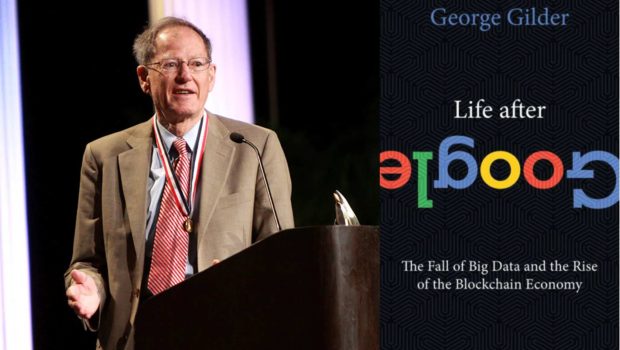Why Google May Go Out of Business: Life After Google by George Gilder, A Book Review
In this time and age, can you imagine life without technologies like Google, A.I., or centralized databases, such as Google Drive? According to a tech-pundit, the time when Google and its technologies are obsolete isn’t that far away.
George Gilder has been a prominent tech chronicler for decades now. He is known for is wild yet, almost correct predictions of technologies. But, when he claims Google will become useless in his latest book ‘Life After Google: The Fall of Big Data and the Rise of the Blockchain Economy,’ how much of that can you believe?
To do that, we have to dive into George Gilder’s past works in this article. We will also provide you a clear understanding of his claims surrounding Google’s obsoletion by doing an honest review of his latest book.
Why should you listen to George Gilder
Let’s look at some of his previous predictions. His most famous prediction might be none other than the 1994 book ‘Life Without Television.’ In this book, Gilder imagined a world without television and incorporating a better substitute, which he named- Teleputer.
Mind you, in the early ‘90’s, a world without television was unimaginable. For the most part, our parents still watch television for entertainment. But Gilder predicted that this ‘Teleputer’ would wipe out tv as the majority’s entertainment source.
According to him, this device will be able to store data and transmit it. It will have two-way communication, unlike tv’s one-way transmission. Through this device, one will be able to order anything, anywhere, anytime. According to him, these devices would be connected via optical fibers. The need for TV will be gone, as this device will be able to provide unlimited entertainment via these optical fibers. He emphasized the store and forward capability of this device, calling it a ‘smart’ technology.
Everything sounds oddly familiar? Because the device he mentioned as teleputer is the modern equivalent of smartphones, tablets, and laptops. These devices, with their capabilities, has indeed made television obsolete for our generation. He imagined all this in the early ’90s when the internet was just getting out, the computers were bulky and had almost no storage capability compared to today’s computers. Mobile phones were hardly available, let alone modern smartphones.
His story fascinated Apple’s Steve Jobs, and he told his co-workers to check out the book. This accuracy in his predictions has garnered him respect in the community, which is reflected in BizReviewed prediction on George Gilder.
Onto our topic of the day-
‘Life After Google: The Fall of Big Data and the Rise of the Blockchain Economy’ a book review
Google has long been dominating the search engine market, virtually providing free search service for everyone who uses the platform. It has also offered it’s famous cloud options such as google drive. Google’s structure is based on technologies such as- big data or A.I.
According to George Gilder, these three concepts together, will be the reason for Google’s downfall.
He states that allowing data to be stored in one place or centralizing the process will threaten the people’s data security. His argument is ‘keeping it all in one sack’ makes it easier for hackers to perform mass data theft. We have seen this often happen with not just Google but also Facebook and Apple, where a large number of personal data was stolen from their database.
The second argument was against A.I. or big data. He argues that google puts too much emphasis on these concepts, whereas these items will never overcome human creativity. A failure of A.I. can be seen with a simple example. Thread site Tumblr tried to introduce a sophisticated A.I. to filter out the porno contents from their website. But the A.I. failed miserably, banning content like dog or tree photos. Gilder argues that the overuse of big data and A.I. limits human creativity, which will threaten the future of Google.
The third argument is a bit incoherent. Gilder has argued the third reason why Google may go extinct is the ‘Marxist’ culture of the company. He points out to the free search service here. He says this type of service threatens the root of capitalism, and Google cannot win fighting against it.
However, the argument is incoherent because Google cannot be further from Marxist ideologies, and it is one of the world’s largest capitalist enterprises. Surely it allows free search, but it is part of their business model. Using search algorithms for site placement, ads, and paid data storage service, Google has all sorts of money-earning schemes that made it one of the world’s largest profitable companies.
Apart from the last point, his other arguments have some valid points. George Gilder put forward an alternative technology for comparison- the Blockchain.
Blockchain has a decentralized database, where it stores data on the user’s computer. One may argue that it is safer than Google’s data fortress, but the argument here is you will need to hack many computers to get the whole data in a blockchain, whereas you need to hack a single database in Google.
Blockchain improves creativity. As the users do not have to answer to a big brother type corporation like Google, they are free to make their choices. No A.I. can impede their creativity in blockchain as it is open for all.
The third argument is comparing financial transactions in blockchain with Google’s ‘free’ service policy. In the blockchain, you need to spend to make interactions, which is quite right, but Google isn’t the ‘Marxist’ pariah that Gilder made it out to be if anything blockchain is even freer than Google Itself.
Pretty compelling argument on all fronts, predicting Google’s downfall. Will it be another masterpiece by Gilder or a false prediction? Only time will tell. But you could read the book to enrich your knowledge anyway.
















